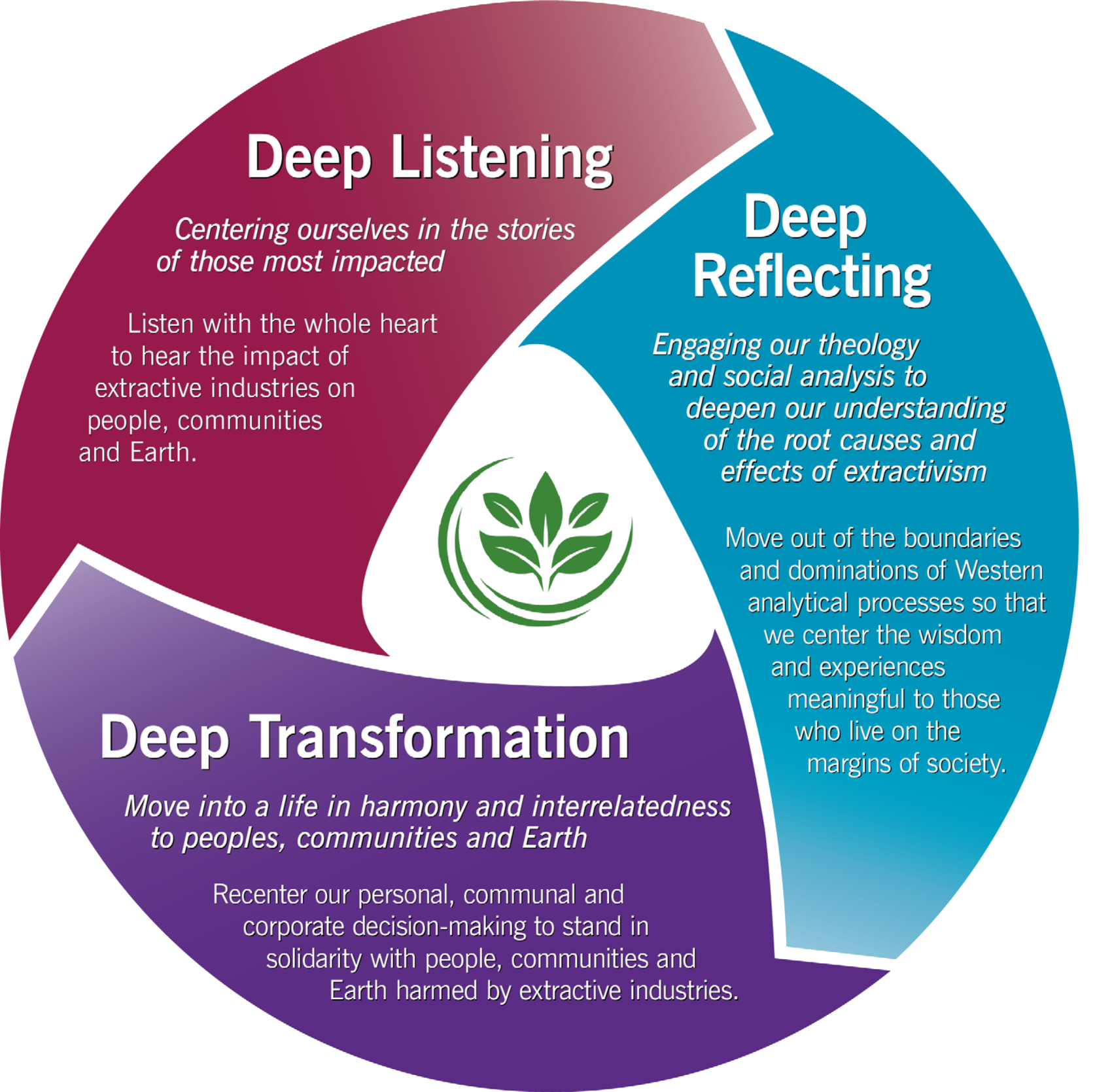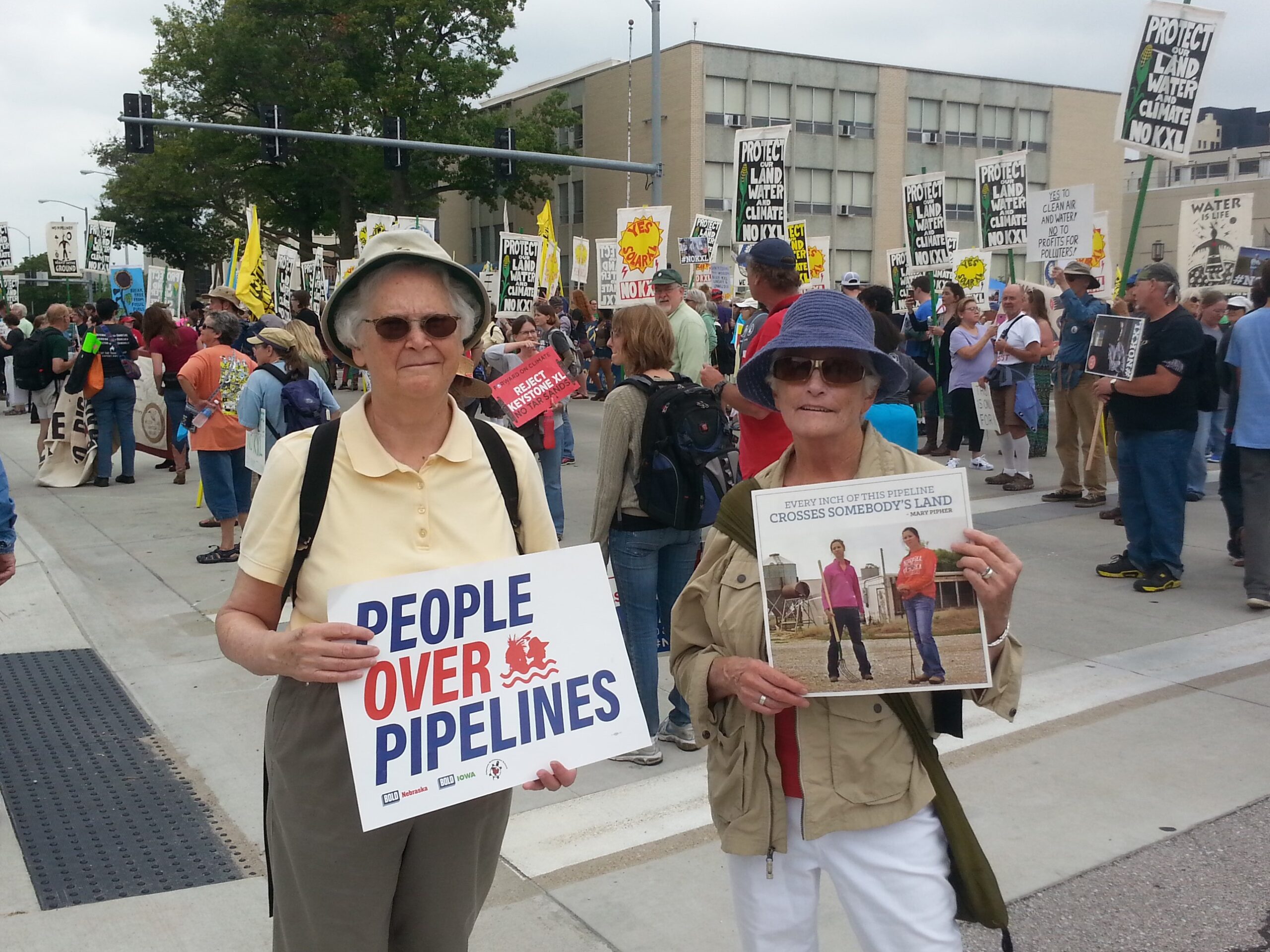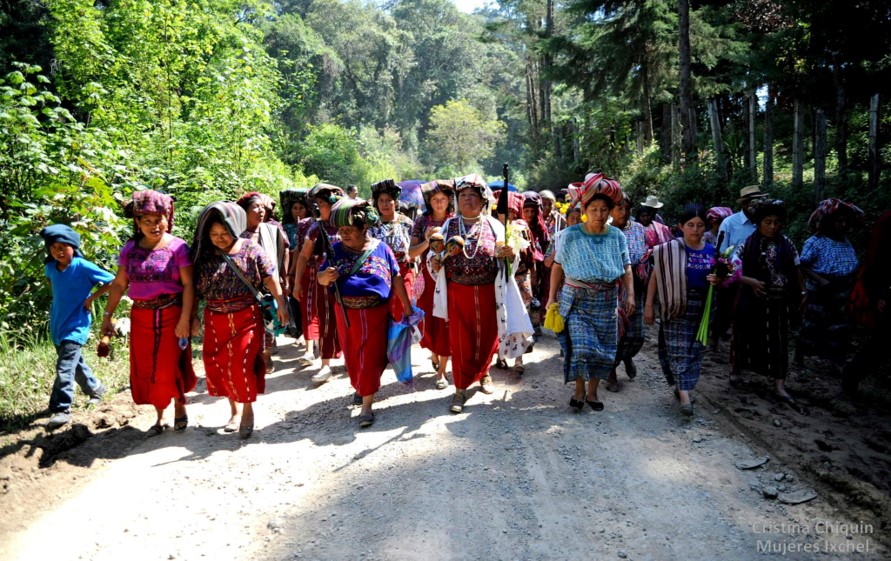Prayer
The prayer resource is available here.
Deep Transformation: Moving into a life in harmony with people, communities and Earth
In our reflections, we have listened to, read about and seen video accounts of the life experiences of people and an Earth that have been negatively affected by extractivism.
We have analyzed and interpreted what we saw and heard. We applied various theological lenses and different perspectives to help us make meaning of those horrendous accounts. We have explored some of the difficulties wrought by the lens of the traditional Western theologies that have so long supported domination, subjugation, oppression and devastation through economic, political, cultural, religious and social means.

Our exploration has animated us to respond to and center our response in the cries of those made poor and the cries of Earth. The devastation of extractivism is unquestionable, yet the issue is complex. We know we may be complicit in the extractive development model by consumption of the products made with extractive industry byproducts as well as through our investment in extractive companies.
Now we are called to respond in a way that continues to center the voices of the people, communities and Earth most impacted by extractivism that have transformed our understanding.
- What do you see and understand differently now?
- How do you ensure that you continue to move forward centered in the voices of people most impacted by extractives instead of in the stories of corporations, consumerism and those who have traditionally held power?
- How do you engage with others who have participated in this process?
- Can you imagine how we might use our individual, communal and corporate voices to awaken our world to what we have learned?
- How am I called to respond to and with those who have been most impacted? That is the big question!

How the Theological Lenses Move Us to Transformation
Pope Francis’ Laudato Si’ lens challenges us: “Many things have to change course, but it is we human beings above all who need to change.” He calls for “new attitudes, new convictions — new ways of being together in this world.” We need to be against what is death-dealing, disastrous, destructive. We need to be protective and care for all creation.
#225 An integral ecology includes taking time to recover a serene harmony with creation, reflecting on our lifestyle and our ideals, and contemplating the Creator who lives among us and surrounds us, whose presence “must not be contrived but found, uncovered.”
#229 We must regain the conviction that we need one another, that we have a shared responsibility for others and the world, and that being good and decent are worth it.
Ivone Gebara (Ecofeminism Lens) shares Pope Francis’ belief that humans are called to change:
“The invitation to love and to be mercy does not come from a reality that is external to us; rather, it is an urge that is present in our very humanity. Within our very being, there throbs in us an incredible attraction toward other beings, toward creation. We must allow our life experiences to be our first teacher.”
Daniel Castillo (Ecoliberation Lens) teaches that Christians are to respond to our planetary emergencies in a way that is grounded both in the preferential option for those made poor and Earth. Our response must reflect our belief in who God is and what God desires.
Engaging in Transformation
As you move forward in the third dimension of our theological reflection of extractivism, you may be tempted to act big, be bold and make a significant change. Practice keeping those decisions and those actions in perspective:
- Who is leading your decision-making?
- What do you need to prioritize in your decision-making regarding extractives?
This is not the END of the process but part of the circle. How can you continue to learn and be open to continued transformation?
What does it mean to acknowledge our individual and collective power and ensure that our actions, while courageous and compassionate, are not driven by that power but in solidarity with Black, Indigenous and people of color communities and Earth?
Transformation is not focused on a “one-time event of clarity and action” but a tug to always dig deeper. It is just as important to advocate for transformation at the systemic level as it is to commit to transformation at the personal level.

Case Studies of Transformative Action
We have collected some Case Studies, to show where communities have responded when their decisions and actions are centered in the experiences of the people, communities and Earth most impacted by extractives. These are not intended to serve as an exhaustive list, but the categories presented offer the structure to explore the paths that may be taken, depending on the situation. They are all different examples, but as you read, pay attention to the similarities and the common themes.
Read these stories with the same curiosity and engagement that you have used for all the stories and witness accounts throughout this process. Where else in the videos and articles in this process did you learn of transformative responses? What do they have in common?

After reflecting on these examples, spend some time in prayer and writing in your journal as you contemplate the following questions:
- What other examples from your own experience and work fit with these examples?
- What do you find yourself drawn to in these illustrative examples within each category? Does that surprise you? Would you have been drawn to the same example at the beginning of this process?
Final Reflection
It is impossible to move forward without taking time to review your notes and journal entries recorded throughout the process. Give yourself prayerful space and time to recall the reflection you have done and how you have learned and grown. The exercises described below may be helpful to you.
- Reflection Time: As you have moved through this theological reflection process, what has stirred in you? Were you pulled to act in some way? If so, what level of action (personal or systemic) did you find yourself moving readily toward, and why did you move toward that level? What connections did you make on the systemic level?
- Creative Expression of your journey: Return now to the voices you heard, the voices of those struggling with the effects of extractivism. Recall the voices of the Indigenous communities and of communities of color most impacted by extractivism. Recall the voices that rose from Earth, the rivers, the trees, and the creatures also impacted by extractivism. We invite you to:
- Write a letter to Earth or to people or communities or to some living creature or plant most impacted by extractives What would you say? Where do you stand in relation to the voice you have chosen? What does this voice say to you about the impact of extractivism?
- Create an artistic expression: written (poem, free verse), oral or graphic (painting, sculpture) that illustrates how you have come to understand the integral relationship between people, communities and Earth in a new or enhanced way through this process.
Moving Into Action
We have guided you on this journey of Deep Listening, Deep Reflecting and Deep Transformation. The next steps are up to you. We invite you to tap into your deeper understanding and sense of where you feel called and look for opportunities to take action in solidarity with people, communities and Earth.
Our frequently updated Action Page contains information on current issues that are global in scope, as well as calls to action at the national level in the United States. You might find theresources there helpful.
Since extractivism has very local impacts, we suggest that you focus your efforts on what is happening in your own community or nearby communities. Seek out organizations acting in solidarity with communities and natural spaces threatened by extractive industries. Get on their mailing lists and discern where your skills, time and knowledge can best be utilized.
We would love to know how you choose to take action, and to hear about the fruits of your actions. You may email us at justice@sistersofmercy.org.
Additional Resources to Go Deeper
Mercy Investment Services’ 2022 Accountability Report, which describes its commitment to reducing its holdings of shares in extractive industries and to investing in climate solutions. which describes its commitment to reducing its holdings of shares in extractive industries and to investing in climate solutions.
Robin Kimmerer’s presentation on Reciprocity (52 minutes). The author of Braiding Sweetgrass asks and begins to answer the questions: What does Earth ask of us? What is the relationship of story, science, justice and language?